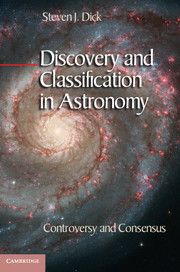Book contents
- Frontmatter
- Contents
- Preface
- Abbreviations
- Introduction The Natural History of the Heavens and the Natural History of Discovery
- Part I Entrée
- Part II Narratives of Discovery
- Part III Patterns of Discovery
- 6 The Structure of Discovery
- 7 The Varieties of Discovery
- 8 Discovery and Classification
- Part IV Drivers of Discovery
- Part V The Synthesis of Discovery
- Appendix 1 Astronomy’s Three Kingdoms
- Appendix 2 Astronomical Discoveries and Their Extended Structure
- Notes
- Select Bibliographical Essay
- Glossary of Concepts Related to Discovery
- Index
7 - The Varieties of Discovery
from Part III - Patterns of Discovery
Published online by Cambridge University Press: 05 August 2013
- Frontmatter
- Contents
- Preface
- Abbreviations
- Introduction The Natural History of the Heavens and the Natural History of Discovery
- Part I Entrée
- Part II Narratives of Discovery
- Part III Patterns of Discovery
- 6 The Structure of Discovery
- 7 The Varieties of Discovery
- 8 Discovery and Classification
- Part IV Drivers of Discovery
- Part V The Synthesis of Discovery
- Appendix 1 Astronomy’s Three Kingdoms
- Appendix 2 Astronomical Discoveries and Their Extended Structure
- Notes
- Select Bibliographical Essay
- Glossary of Concepts Related to Discovery
- Index
Summary
I do believe that one can discern general themes in the history of discovery in science and I shall even venture to mention some, but mainly for the purpose of emphasizing variety over uniformity.
Abraham Pais, 1986Useful as the tripartite structure of detection, interpretation, and understanding is in appreciating the extended structure of discovery, we are far from showing that this is the only structure of discovery in astronomy, much less in science. In fact, we should be skeptical of such a simple view that a single structure is universal to all types of discovery. After all, we have seen that some classes (gas giant planets, giant and dwarf stars) have been inferred over very long periods rather than detected, while others (dwarf planets) have been suddenly declared. And as we saw in the last chapter, the discovery of new classes of astronomical objects is only one of many categories of discovery that historians and philosophers of science, ranging from Norwood Russell Hanson to Theodore Arabatzis, have distinguished.
Scientists themselves have cautioned against simplifying what they as practitioners recognize as a complex process. Referring to Thomas Kuhn’s attempts to find structure in the strikingly numerous discoveries from 1895 to 1905, including the contributions of Roentgen, Bohr, Planck, Einstein, Becquerel, Thomson, and Rutherford, the theoretical physicist Abraham Pais wrote that “Such facile and sweeping generalizations only serve to create serious pitfalls of simplicity. I do believe that one can discern general themes in the history of discovery in science and I shall even venture to mention some, but mainly for the purpose of emphasizing variety over uniformity. After decades spent in the midst of the fray I am more than ever convinced, however, that a search for all-embracing principles of discovery makes about as much sense as looking for the crystal structure of muddied waters.” In short, Pais confessed to “very strong reservations concerning the usefulness, let alone the necessity, of a search for general patterns or laws of history, specifically the history of discovery.”
- Type
- Chapter
- Information
- Discovery and Classification in AstronomyControversy and Consensus, pp. 201 - 232Publisher: Cambridge University PressPrint publication year: 2013



